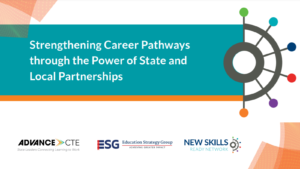 Intentional and early collaboration between state and local leaders is vital to ensuring success in high-quality career pathways for all learners. Strengthening partnerships between local entities and state agencies helps each partner achieve its mission and amplify its reach.
Intentional and early collaboration between state and local leaders is vital to ensuring success in high-quality career pathways for all learners. Strengthening partnerships between local entities and state agencies helps each partner achieve its mission and amplify its reach.
Given the state’s vital role in creating aligned systems, leaders in education, workforce and public policy must commit to breaking down silos and building up trusting, collaborative relationships. This means that leaders at both the state and local level must work together to create shared visions and mindsets and align their work to better support all learners.
Strengthening state and local partnerships is a critical strategy to advance mutual interests that benefit learners and the entire career pathways system as a whole. Advance CTE’s latest publication, Strengthening Career Pathways through the Power of State and Local Partnerships, suggests five strategies states can take to build, refine and sustain partnerships across state and local parties — with a specific focus on the challenges that exist in beginning and sustaining those partnerships. Each section of the report describes what the strategy looks like in practice and provides state and local examples of promising practices across the country.
Those strategies include:
Leveraging federal and state funds to fuel local innovation, using state criteria as guidelines for quality.
For example, Tennessee leveraged Strengthening Career and Technical Education for the 21st Century Act (Perkins V) reserve funds and provided technical assistance to help Wilson County build and scale a special program for biotechnology that would meet the state’s criteria for approval. After initially approving the program in 2018 as a “special program of study,” the Tennessee Department of Education worked to scale the biotechnology program into the now statewide BioSTEM program of study in the 2019-2020 school year.
Providing meaningful technical assistance to help local administrators define roles and establish shared definitions, goals and strategies.
For example, the Nebraska Department of Education’s reVISION process lays the foundation for strong state and local partnerships through direct technical assistance and support for local education agencies through the use of a state-level reVISION coordinator to collaborate with on the work.
Sharing knowledge, ideas and best practices by extending expertise and leveraging convening power.
This approach helps local leaders identify proven strategies to overcome challenging barriers. For example, the Colorado Community College System recognized the importance of flexibility, relationship development and collaboration when working on the strategic planning process for Perkins V. This included sharing information on the CTE visioning and strategic planning process, collecting feedback on how to improve the state CTE system as a component of Colorado’s talent strategy, and establishing mutually beneficial relationships with stakeholders for feedback.
Strong state and local partnerships are a key component of any high-quality Career Technical Education (CTE) program. As state leaders begin implementing their Perkins V plans, they have a responsibility to build partnerships with local leaders across their state. States can do this by building trusting and collaborative relationships with local leaders and leveraging economies of scale to provide innovation funding, offer technical assistance and share best practices. This report, and the strategies included, is one tool designed to support state leaders in this endeavor.
Visit Advance CTE’s Learning that Works Resource Center for more resources on systems alignment and access and equity to CTE. Visit the New Skills ready network series page to read all three policy briefs with promising practices to strengthen career pathways.
